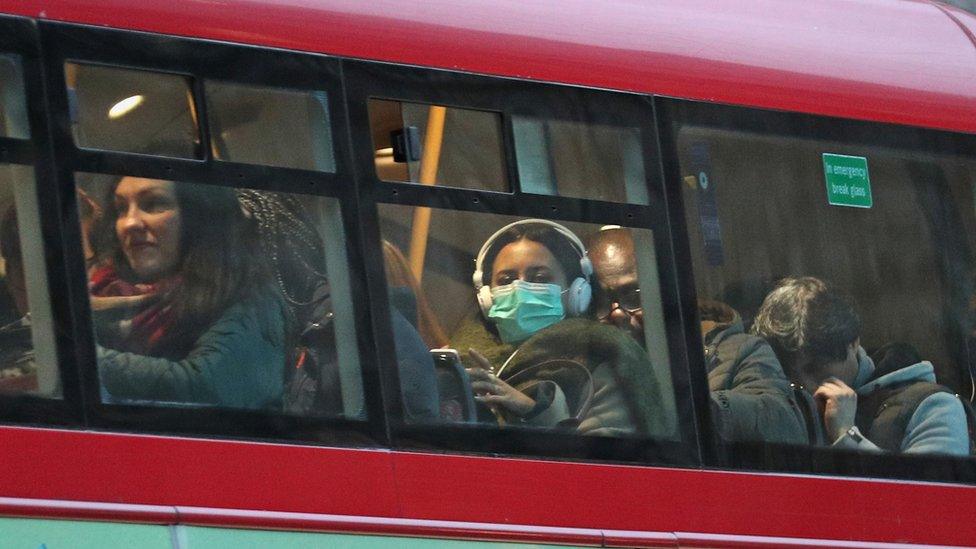Coronavirus: Thirteen more cases confirmed in UK
- Published
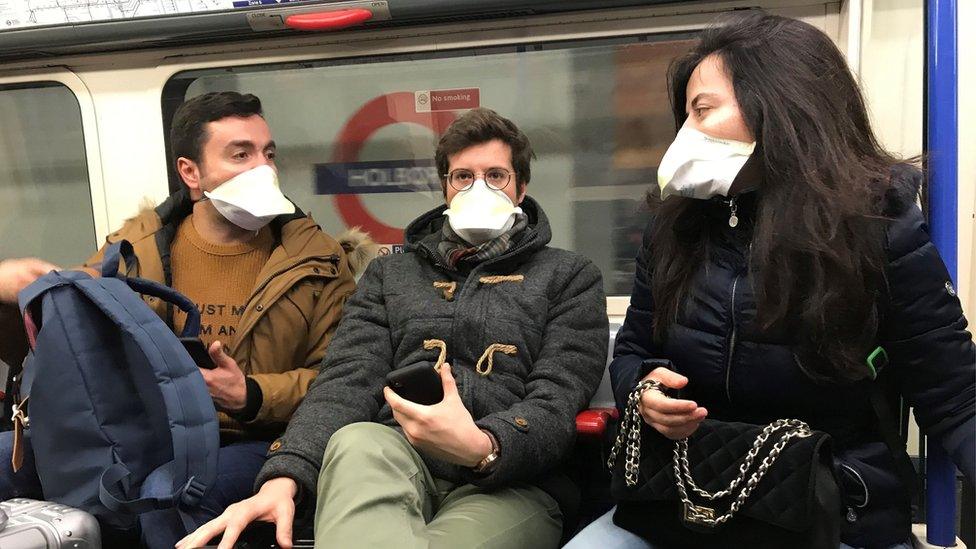
Some people in the UK have begun wearing masks as the number of cases increases
Twelve more people in England and one in Scotland have tested positive for coronavirus, taking the total number of UK cases to 36.
Scotland confirmed that its first patient was a Tayside resident who recently returned from Italy.
Three of the new cases in England were linked to a man from Surrey, who was the first to be infected within the UK.
It comes after Health Secretary Matt Hancock said the UK was still in the "containment" phase of the outbreak.
He said the government contingency plans, which will be published this week, included banning big events.
The Scottish government confirmed its first case on Sunday evening. It said the patient was receiving treatment in isolation in hospital.
Three of the new cases revealed on Sunday were close contacts of the man from Surrey, who was announced as testing positive on Friday.
They included another person from Surrey and two people from West Sussex who were all "part of an adult family cluster", Public Health England said.
Another new case from Essex had "no relevant travel" and it was unclear how they had contracted the virus.
The remaining eight had visited affected areas - six to Italy, and two to Iran. They were from London, West Yorkshire, Greater Manchester, Hertfordshire and Gloucestershire, and included:
One person from Bury, who had become infected in Italy.
Two Leeds residents, who had both been in Iran
One person from Bradford, who had travelled to Italy
Someone from Gloucestershire - infected in northern Italy - who is linked to another case from the area announced on Saturday
Prof Chris Whitty, the chief medical officer, said all of the newly identified cases were being investigated and health officials had begun tracing anyone who had close contact with them.
As of 09:00 GMT on Sunday, the Department of Health said a total of 11,750 people had been tested in the UK.
The latest positive tests come after three more cases were confirmed in England on Saturday.
One of those was a member of staff at St Mary's School in Tetbury, Gloucestershire, the primary school said on Sunday.
That follows another school - Willow Bank Infant School in Woodley, Berkshire - confirming, external that one of its staff had been infected.
Matt Hancock on isolating cities: "We don't take anything off the table at this stage"
The government has said no tactics will be "off the table" as part of its plan to contain the virus in the UK.
Mr Hancock told the BBC's Andrew Marr Show an emergency "battle plan", drawn up for the "worst case scenario", includes banning big events, closing schools and dissuading people from using public transport.
The health secretary said there were four phases to the plan:
Containment - caring for any infected people and identifying their close contacts
Delay - deciding what actions to take to slow down the spread
Mitigation - damage limitation if the virus spreads widely
Research - constant and ongoing work to inform the three other phases
Currently, the UK is in the "containment" phase - which health leaders say may still be sufficient.
But the next phase could see broader "social distancing" measures.


Matt Hancock would have been warned there was a strong likelihood there would be a jump in cases when he did his interview for the Andrew Marr Show.
A few hours later the biggest increase in a single day was announced, with 12 more people testing positive for the coronavirus. That's why he went further than before in setting out possible government plans to tackle an accelerated spread of the virus around the UK if that happens.
School closures, cancellations of major public events and moves to persuade people to work at home are clearly options being actively considered.
The strategy seems to be to warn that difficult measures may be needed while focusing on trying to contain the spread of the virus. As one government source put it, "prepare for the worst, work for the best".

Labour shadow health secretary Jonathan Ashworth said Mr Hancock must give more detail of any emergency powers he wants to bring in so that MPs "can properly scrutinise" the plans.
Meanwhile, Lib Dem MP Layla Moran has written to the health secretary, external to urge him to make sure people are paid if they have to self-isolate, otherwise there could be "devastating" effects.
Prime Minister Boris Johnson, who will chair a meeting of the government's Cobra emergency committee on Monday, visited Public Health England's centre in north London on Sunday to discuss attempts to limit the spread of the virus.
He said the virus was "likely to spread a bit more" but he was "very, very confident" the NHS would be able to cope with an outbreak.
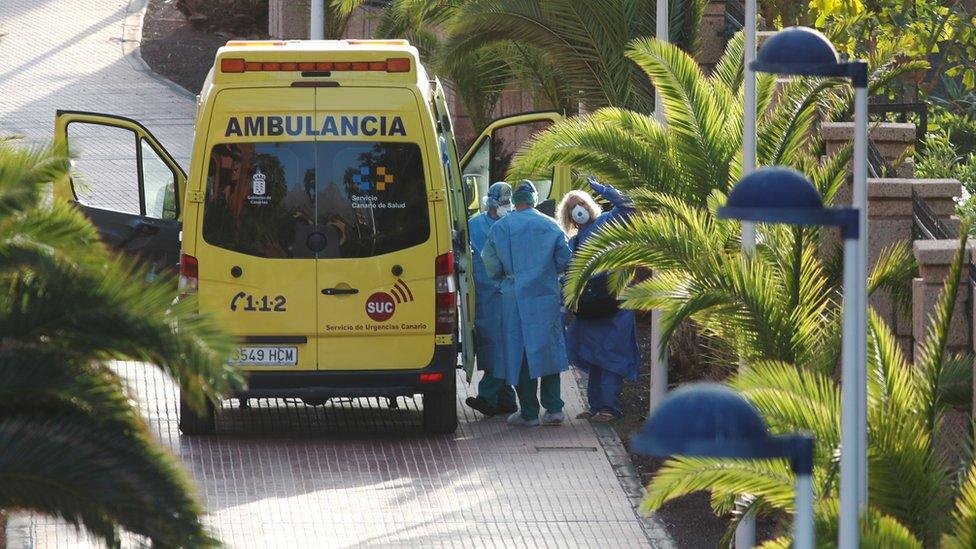
Tourists at the H10 Costa Adeje Palace hotel have been quarantined and tested for the virus
More than 200 British holidaymakers locked down at a quarantined hotel in Tenerife have been told they will be allowed to fly home, if they test negative for the virus.
The travellers have been quarantined at the H10 Costa Adeje Palace hotel since Tuesday after four Italians contracted the virus. Some have already been allowed to leave but others are awaiting test results.
The Foreign Office is in contact with operators and travel agents about their plans to return Britons to the UK.

What do I need to know about the coronavirus?
WHAT ARE THE SYMPTOMS? A simple guide
WAYS TO PREVENT CATCHING IT: How to wash your hands
WHERE ARE WE WITH A VACCINE? Progress so far
A VISUAL GUIDE TO THE OUTBREAK: Virus maps and charts
WHAT DOES IT MEAN FOR MY HOLIDAY? Your rights as a traveller

Globally, around 86,000 people have been infected, with cases in more than 50 countries. About 3,000 people have died - the vast majority in China's Hubei province, where the outbreak originated in December.
In other developments:
The Foreign Office has announced some British Embassy staff are being withdrawn from Iran because of the outbreak in the country. Iran reported 385 new cases on Sunday, bringing the total to 978 so far. The death toll rose to 54
Foreign Secretary Dominic Raab has tested negative for the virus. The Foreign Office said he self-isolated after feeling unwell this week - and has returned to work since the test result
A secondary school in Ireland is to close for 14 days because the country's first confirmed case had been in contact with its pupils and teachers
In Paris, the Louvre museum did not open on Sunday. The museum said on Twitter a meeting was being held on the public health situation and "the museum cannot open at the moment".
Australia and Thailand recorded their first fatalities from the virus on Sunday. A 78-year-old Australian man died after being infected on the quarantined Diamond Princess cruise ship in Japan. Thailand said the 35-year-old man who died of the virus had also been suffering from dengue fever
The leader of a religious sect in South Korea - which is facing the worst outbreak outside China - could face a homicide investigation over some of the country's deaths. Lee Man-hee is accused of hiding the names of some members as officials tried to track patients before the virus spread
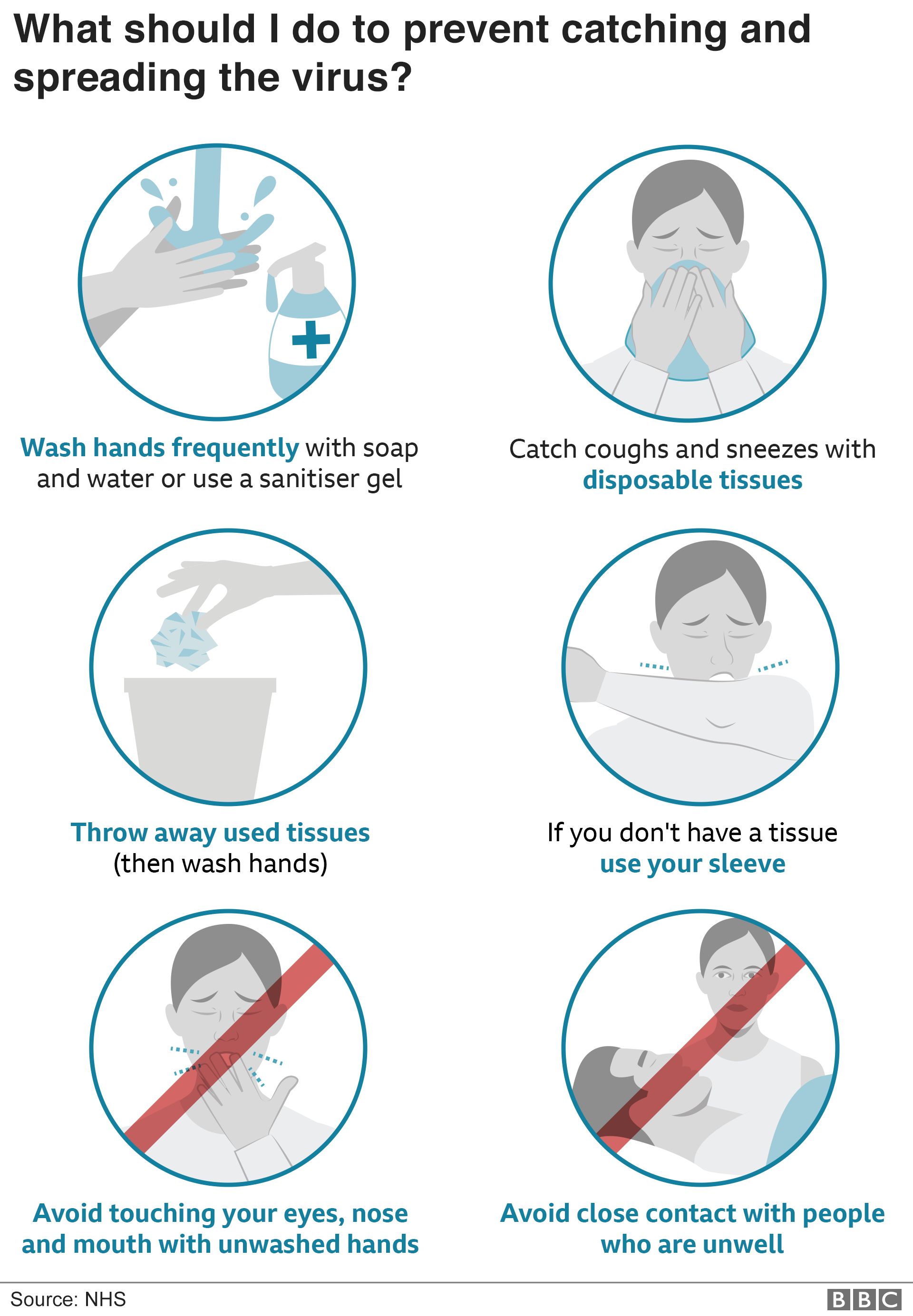

Have you been affected by the coronavirus? Or do you have any information to share? Get in touch by emailing haveyoursay@bbc.co.uk, external.
Please include a contact number if you are willing to speak to a BBC journalist. You can also contact us in the following ways:
WhatsApp: +44 7756 165803
Tweet: @BBC_HaveYourSay, external
Send pictures/video to yourpics@bbc.co.uk, external
Please read our terms & conditions and privacy policy
- Published1 March 2020
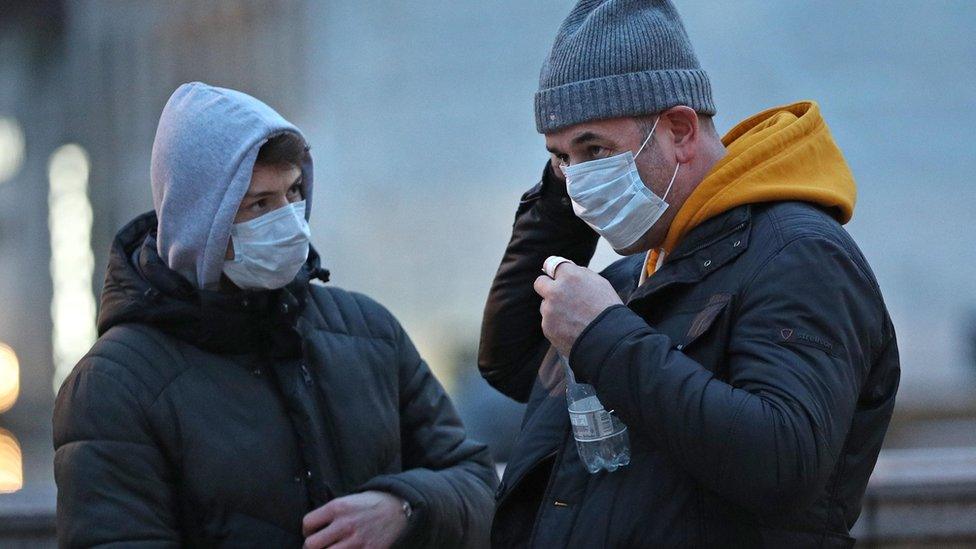
- Published29 February 2020
